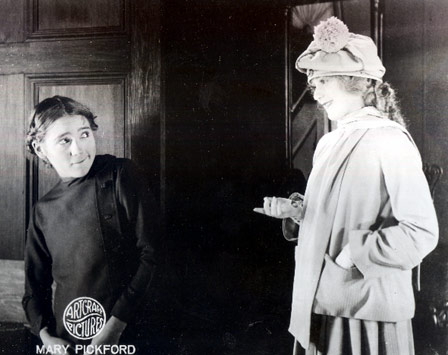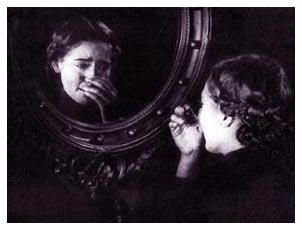Mary Pickford's Stella Maris, from 1918, is a genuinely strange film, not by any
means, I think, the conventional melodrama it pretends to be. Pickford plays two roles in it — the pampered, protected,
ethereal Stella Maris and the homely, hard-luck Unity Blake, a
characterization bordering on the grotesque. On paper, the title role
ought to be the star part, and in a way it is — Stella gets the good
lighting, the pretty clothes and the guy. But Unity steals the show,
blowing all the other actors off the screen — including Pickford as
Stella in the double exposures.
Stella is sweet, but she delivers little more than poise on screen,
while Unity has energy, quirkiness, self-perception and soul. The
performance by Pickford in the role is sublime — she never strikes a
false note, never steps beyond the twisted, battered persona of the
orphan Unity . . . and yet in her moments of despair, yearning,
resolution, she achieves the kind of transcendent beauty we often see
shining out from behind the many grotesque masks of Lon Chaney. Stella,
by contrast, seems like something seen in a shop window.

It's hard not to believe that there was something deliberate in this,
however unconscious. Perhaps it could be explained by the fact that
Pickford simply got carried away, inspired beyond reason, by the role
of Unity. But why pull back so far in the other role? Stella has little
to do beyond smile or sigh at the wickedness of the world. Stella is a
doll-woman, Unity is a force of nature, and the contrast is
illuminating.
It's finally very difficult to come up with a reason for the hero to fall in
love with Stella — the love scenes between them are oddly bloodless
and perfunctory. There are a lot of reasons for him to fall in love
with Unity, who loves him hopelessly. The two times he and Unity
embrace in the film are electrifying and very moving. There's something
close to bitterness in the choices Pickford makes in the two
characterizations and it sets the melodrama of the story on its ear.

I think it's fair to see in the dual role some kind of metaphor for
female duality — not the duality of woman as a man might conceive it,
between angel and whore, but as a woman might, as Pickford might,
between ugly-ducking and swan. Pickford was hardly a “normal” woman of
the early 20th Century — but she played one on stage and on screen.
The contrast between the normal life she incarnated dramatically and
the actual life she led must have weighed on her psyche. She was not a
conventional beauty, yet her attractiveness put bread on her family's
table — the judgment of others, of men, often meant the difference
between success and failure. Is it too fanciful to imagine that she
sometimes, in the tough times, looked at herself in the mirror — as
Unity does in this film — and despaired of her assets, feeling doomed?
Certainly Pickford's heart is with Unity in this film — and so is the
viewer's. The performance is one of the greatest achievements of silent
cinema. It defines the film in a way that would not have been possible
in the sound era, when the literary text set such a limit on what a
film could be, could mean. A transcendent performance that violated the
text, as Pickford's performance as Unity violates the text of Stella
Maris, would have resulted at best in an interesting failure in a
sound film. Here it results in an improbable, breathtaking, emotionally
disconcerting masterpiece.
